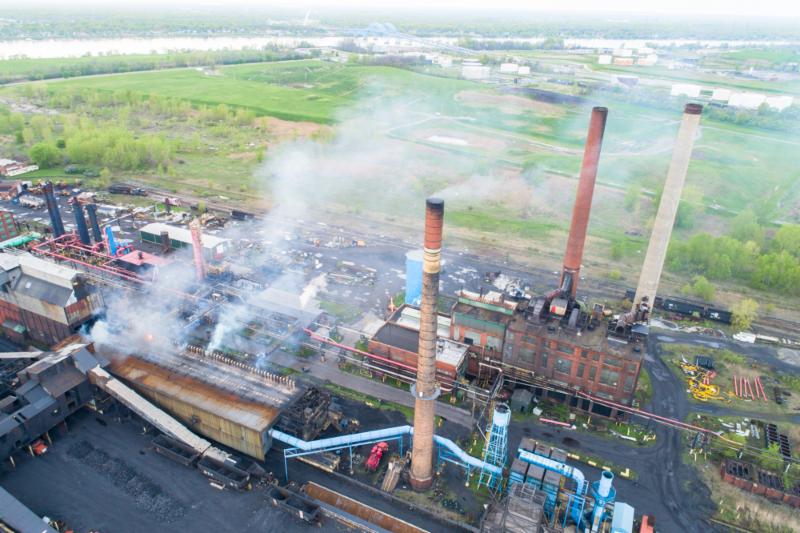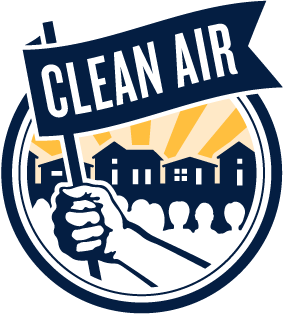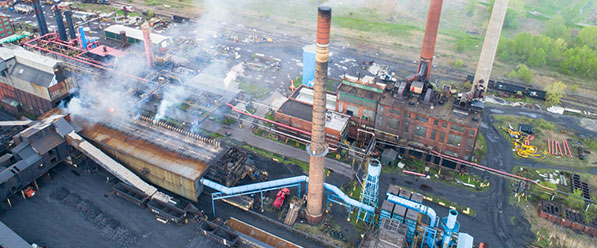NRG Huntley Coal Announces Plans to Remediate Site
Once in 100 Year Opportunity to Transform Tonawanda’s Waterfront
Today is the deadline for the New York Department of Environmental Conservation’s public comment on the NRG’s application to remediate a portion of the 100 year old Huntley coal site, located on the Niagara River.
The NRG Huntley Coal facility announced closure in 2015 and stopped producing energy from coal in 2016. At the time of closure the company was the largest polluter in Erie County. The company was no longer financially viable after the influx of natural gas into the energy markets. In March of 2018 NRG listed the site for sale, and in October applied for a portion of their site to be remiendiated under the New York State brownfields program.
The New York State Brownfield Program encourages private-sector cleanups of land that is contaminated. Companies that are approved are eligible for tax credits and may be relieved of future site liabilities. This application provides an opportunity to remediate and re-develop a portion of this site in a way that improves community health, creates jobs, and regains access to the waterfront for the first time in over 100 years.
The current brownfield application is for remediation of the south parcel portion of their site. Approximately 15 acres of this portion includes former coal piles, 3 acres includes the south settling ponds, 3 acres are occupied by two equalization basins. The remaining acreage, approximate 14 acres, consists of site roads and open space.
The presence of coal piles, ash ponds and a fly ash landfill on the site presents the possibility that toxic byproducts of coal waste (including arsenic, cadmium, chromium, mercury and selenium) are leaching into the soil, threatening the groundwater and the Niagara River. Each one of these contaminants can be hazardous to human health.
In their own application, NRG states that arsenic has been found in the berms next to the River Road bike path. Assessing the level of contamination is vital to remediation, redevelopment, and to eventually access the waterfront – objectives that are all very clearly stated in the town’s economic development plans.
In order to be accepted into the program, and secure valuable tax credits, a public comment process must be completed.
In our comment to the State of New York, we urged that remediation efforts must meet levels that are safe enough for humans to use this site for recreation and access to the water.
We also requested that the New York State Department of Environmental Conservation require NRG to reassess the contaminants on their over 3,000 ft waterfront site. The environmental assessment included in NRG’s state application dates back to 1998 – completed 20 years ago at the time that NRG purchased the facility and site from Niagara Mohawk.
“The 20 year report is outdated,” our comment states, “and the scope is limited in number of samples and contaminants. We encourage an updated, more rigorous investigation of the site as part of the initial phase of the BCP process, and that this assessment be consistent with the potential use of the site to use for commercial and recreational activities. “
The November 9th deadline is the first phase of the remediation process.
Tonawanda Coke Shuts Down
On Friday, in U.S. District Court, it was revealed that Tonawanda Cokeplans to shut down its facilities as early as next Tuesday. Please join us for a press conference today, at 6pm, outside of the DEC Office at 270 Michigan Avenue in Buffalo.
The shutdown follows more than 10 years of community organizing; meetings, complaints, petitions, protests and press conferences. For members of Clean Air this has been a long time in the making.
Clean Air members living in neighborhoods adjacent to the company’s property have experienced the egregious behavior of Tonawanda Coke for over a decade.
Resident organizing resulted in a 2009 raid of the facility by 50 federal and state agents for ongoing environmental health violations. In 2013, a federal jury found the company and Mark Kamholz, environmental manager, guilty of 14 criminal charges, including violations of the federal Clean Air Act, and violations of the Resource Conservation and Recovery Act, in regard to the improper disposal of benzene, a known human carcinogen. Last month, the company was found guilty of violating their criminal probation.
Tonawanda Coke also has a long history of endangering workers at their plant, in at least one instance resulting in death. The U.S. Department of Labor’s Occupational Safety and Health Administration defines a serious violation as “when death or serious physical harm could result from hazards about which the employer knew or should have known. In 2014,OSHA cited the plant, and Kirchner LLC, which provides Tonawanda Coke temporary workers, with 17 serious violations, including putting employees at risk of falls, amputations and crushing injuries, according to the agency’s press release. Two years after OSHA cited the company with these violations, Richard Wade, a 60-year-old employee, died after he was pulled into the rotating shaft of a coal elevator. In a statement to the Buffalo News, OSHA stated the death could have been prevented if Tonawanda Coke followed federal standards.
Due to the long history of abuse, Clean Air is calling for the following to be ordered as the company shuts down:
The US District Court, the Environmental Protection Agency and the New York Department of Environmental Conservation require the company to include how the company will contain fugitive air emissions in case of further collapse in their emergency shutdown plan.
Clean Air is calling on state and federal agencies to require Tonawanda Coketo fund continued health monitoring of all employees, including temporary workers, to guard against any potential occupational health issues. In addition, we request that a portion of fines are used to help workers build skills for gainful employment elsewhere.
Clean Air is calling on Judge Skrently and the New York State Department of Conservation to require Tonawanda Coke and CEO Paul Saffrin commit and set aside funding for site remediation. Tonawanda Coke sits on river front property, in a neighborhood with families and children. Paul Saffrin should commit the appropriate funds to ensure site remediation to redevelop the site in a way that is consistent with the Tonawanda Tomorrow economic development plan.
While our membership breathes in relief today, it is not lost on us that this has been a long and tremendous fight. Despite over a decade of abuse,Tonawanda Coke has been allowed to continue operating, and Paul Saffrin and his investors have gotten rich off of destroying our bodies and our community.
Tonawanda Coke is not an isolated actor in the exploitation of communities, workers, and our environment, and until we shift the types of businesses we have in our economy, and ensure that people are put first over shareholders and CEO’s wealth, the Tonawanda Cokes of the world will continue to exist, and poor and working class people and people of color will continue to bear the burden, and have to clean up the mess.
What we need is an economy that centers poor and working-class people and people of color through equity and justice. What we need are state and federal agencies that are transparent and place communities at the forefront of decision making. What we need are elected officials that keep these agencies accountable to communities that elect them.
We believe that the world we want to see can only happen if we continue to organize, if we continue to build power, if we continue to shift our culture to one of equity and justice.
New York State Hearing on Tonawanda Coke’s Cease and Desist Order October 10th
- This type of hearing may last a day or multiple days.
- The hearing is open to the public, however space is very limited.
- The will be multiple phases to this hearing. Wednesday will be focusing on non-air related environmental issues.
THANK YOU TO OUR GENEROUS FOOTBALL, FOOD & FUN(DRAISER) SPONSORS!
THANK YOU TO OUR SPONSORS!
We are excited to announce Clean Air’s Football, Food & Fun(draiser) Sponsorship Partners. We are grateful to have the support of so many incredible businesses and organizations. Together, we will ensure that Western New York continues to strive for healthy, just and equitable communities.
Touchdown Sponsors
Tobacco Free Erie Niagara
MidCity Office Furniture
Field Goal Sponsor
Erie County Executive Mark Poloncarz
Turnover Sponsors
Advanced Dental PC
Allen Street Consulting
Friends of Monica Wallace
Angela Marinucci for Erie County Clerk
International Brotherhood of Electrical Worker, Local Union 41
SMART Local 71
Tonawanda Coke Found Guilty
Today, US District Court Judge William Skretny found that the Tonawanda Coke Corporation is guilty of criminal probation violations.
This verdict was delivered after a full day hearing last Friday, regarding violations of their 2014 criminal sentence. (watch Investigative Post’s summary of of Tonawanda Cokes criminal history) At the hearing the US Government referenced many instances where the company violated the probation order, including numerous compliance issues brought forth by the New York State Department of Environmental Conservation and the US Environmental Protection Agency; specifically citing daily opacity violations, an inspection revealing a giant hole in the company’s ammonia tank resulting in a chemical leak, and structural damage at the facility. The US Government has requested requested that the court issue a Cease and Desist.
Sentencing will be determined this Friday at 9am at 2 Niagara Square. Join us for this historic moment.
Tonawanda Coke’s Probation Case Continues
This morning Tonawanda Coke appeared in US District Court in front of the Honorable Judge William Skretny regarding potential violations of the company’s probation from their 2013 court case and 2014 criminal sentence.
At the hearing, US Attorney Aaron Mango referred to many instances where the company violated the probation order, including numerous compliance issues brought forth by the New York State Department of Environmental Conservation and the US Environmental Protection Agency; specifically citing daily opacity violations, an inspection revealing a giant hole in the company’s ammonia tank resulting in a chemical leak, and structural damage at the facility. The US Government requested an immediate hearing, and if Tonawanda Coke is found guilty of probation violations requested that the court issue a Cease and Desist. Mango went on to say “What the Government wants is for the community to stop breathing hazardous air.”
Attorney’s for Tonawanda Coke stated that the company has hired a expert to deal with the repairs to their coke oven battery and opacity, and that this consultant will have a root cause analysis completed by September 14th.
Judge Skretny issued the following:
- By close of business today, Tonawanda Coke’s attorneys must submit a response to the US Government’s petition.
- By close of business tomorrow (Wednesday the 5th) the US Government must submit a response to the company’s papers.
- By close of business on Thursday the 6th, the company must respond to the US Government.
- Both parties will meet back in court on Monday the 10th at 2pm.
Clean Air will be holding a public meeting to discuss what happened in court, and generate community demands as this case continues.
The meeting will take place this Thursday, September 6th at the Broundshidle Post (3354 Delaware Ave. in Kenmore) at 6pm.
Tonawanda Coke to Appear in US District Court on Tuesday
On Tuesday, September 4th at 10:30am Tonawanda Coke and CEO Paul Saffrin are ordered to appear back in US District Court in front of the Honorable Judge William Skretny regarding potential violations of the company’s probation from their 2013 criminal sentence.
Federal probation officials contend the company’s emissions are a threat to human health and the environment and the company violated its pledge not to commit any other crimes after it’s sentencing in 2013. The NYS Department of Environmental Conservation has issued 176 violations to the facility since January.
Tonawanda Coke’s collapse of their heat waste tunnel earlier this year does not bear well for the future of the facility to remain in operation. In addition to the equipment failure, the Department of Environmental Conservation issued a Cease and Desist of the company’s coking operations this July. Despite the order, Tonawanda Coke has continued to operate.
Clean Air calls on the courts, the Department of Environmental Conservation and the US Environmental Protection Agency to ensure that Tonawanda Coke is accountable to workers and the community if the company is allowed to remain in operation, or if CEO Paul Saffrin decides to shut it down.
Clean Air’s requests include:
- The US District Court, the Environmental Protection Agency and the New York Department of Environmental Conservation require the company to submit and make public an emergency shut down plan, which includes how the company will contain fugitive air emissions in case of further collapse.
- Clean Air does not believe that putting people out of work is the answer. If CEO Paul Saffrin decides to take away the ability for his workers to provide for their families, instead of investing the protections to run a clean sustainable business, we request that a portion of fines are used to help workers gain skills for gainful employment elsewhere. In addition, Clean Air is calling on Judge Skrenty to require Tonawanda Coke to fund continued health monitoring of all employees, including temporary workers, to guard against any potential occupational health issues.
- Clean Air is calling on Judge Skrently and the New York State Department of Conservation to require Tonawanda Coke and CEO Paul Saffrin commit and set aside funding for future site remediation in case of closure. Tonawanda Coke sits on river front property, in a neighborhood with families and children. Paul Saffrin should commit the appropriate funds to ensure site remediation to redevelop the site in a way that is consistent with the Tonawanda Tomorrow economic development plan.
Clean Air members who live in neighborhoods adjacent to the company’s property have experienced the egregious behavior of Tonawanda Coke for over a decade. Resident organizing resulted in a 2009 raid of the facility by 50 federal and state agents for ongoing environmental health violations. In 2013, a federal jury found the company and Mark Kamholz, environmental manager, guilty of 14 criminal charges, including violations of the federal Clean Air Act as well as violations of the Resource Conservation and Recovery Act, in regard to the improper disposal of benzene, a known human carcinogen.
Tonawanda Coke has also had a long history of endangering workers at their plant, in at least one instance resulting in death. In 2014, U.S. Department of Labor’s Occupational Safety and Health Administration cited the plant and Kirchner LLC, which provides Tonawanda Coke temporary workers, with 17 serious violations. The violations included putting employees at risk of falls, amputations and crushing injuries, according to the agency’s press release. OSHA defines a serious violation as “when death or serious physical harm could result from hazards about which the employer knew or should have known. Two years after OSHA cited the company with these violations, a 60-year-old employee, Richard Wade, died after he was pulled into the rotating shaft of a coal elevator. In a statement to the Buffalo News, OSHA stated the death could have been prevented if Tonawanda Coke followed federal standards.
Tonawanda Coke has been able to operate in this way because we exist in a economic system that allowed them to. We elect politicians that have enacted laws that have allowed them to. We participate in a culture that has allowed them to. This company is not an isolated actor, and until we shift the types of businesses we have in our economy, and ensure that people are put first over shareholders and CEO’s wealth, the Tonawanda Coke’s of the world will continue to exist, and working class people and people of color will continue to bear the burden, and have to clean up the mess.
We encourage our members to attend this history hearing. For more information contact Brian or Rebecca at 716-852-3813.
Tonawanda Coke Corporation Issued Shutdown Order!
- Improperly placing hazardous waste into battery ovens,
- Insufficient labeling of hazardous waste and record keeping violations,
- Falling to perform required testing at a wastewater outfall earlier this year,
- Twenty-nine violations related to chemical storage, including record keeping, labeling and maintenance violations and an unreported spill,
- Unreported petroleum spills and unregistered tanks.
Tonawanda Coke Confirms Waste Tunnel Collapse
In May, The Tonawanda Coke Corporation confirmed our allegations that the waste heat tunnel at their facility had collapsed, possibly causing toxic emissions to spew into the surrounding community.

The waste heat tunnel is a concrete tunnel that runs underground the length of the battery, all 60 coke manufacturing ovens. The main purpose of the waste heat tunnel is to collect the waste combustible heat from the ovens. Now that the tunnel has collapsed, gases can’t normally flow into the facility’s chimneys, and the company can’t draw enough fresh air into the manufacturing process. Without enough fresh air drawn into the process, the coking process will possibly create toxic releases into the ambient air, and into the surrounding community.
You can view the press coverage here from the Buffalo News, WIVB Channel 4,and WGRZ, Channel 2.
We call on the Environmental Protection Agency, the US Attorney General’s Office and the New York State Department of Environmental Conservation to perform a full investigation of the incident. We are calling on state and federal agencies to determine the cause of the tunnel collapse, risks posed to workers, and risks posed to the surrounding community.
If you live or work in the area and are noticing dark smoke or odors coming from the facility, submit a complaint to the New York Department of Conservation by calling 851-7000 or completing and mailing in this complaint form.
We will keep you posted as this situation progresses.

